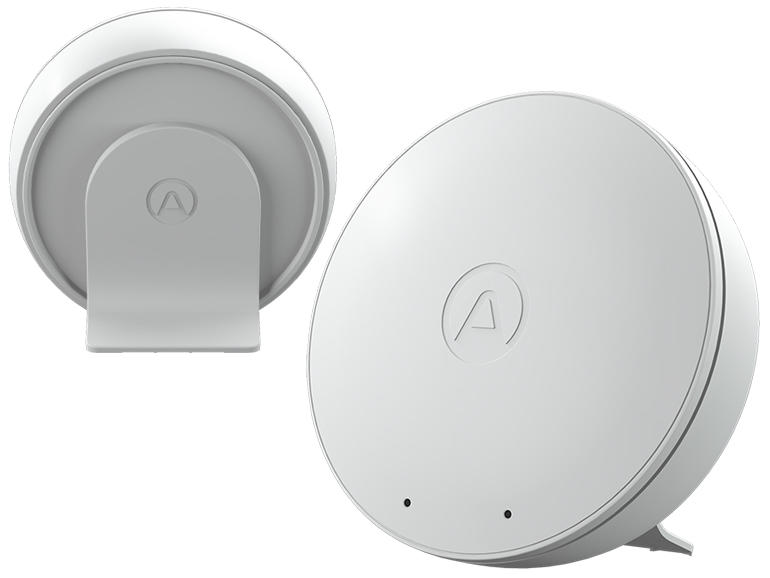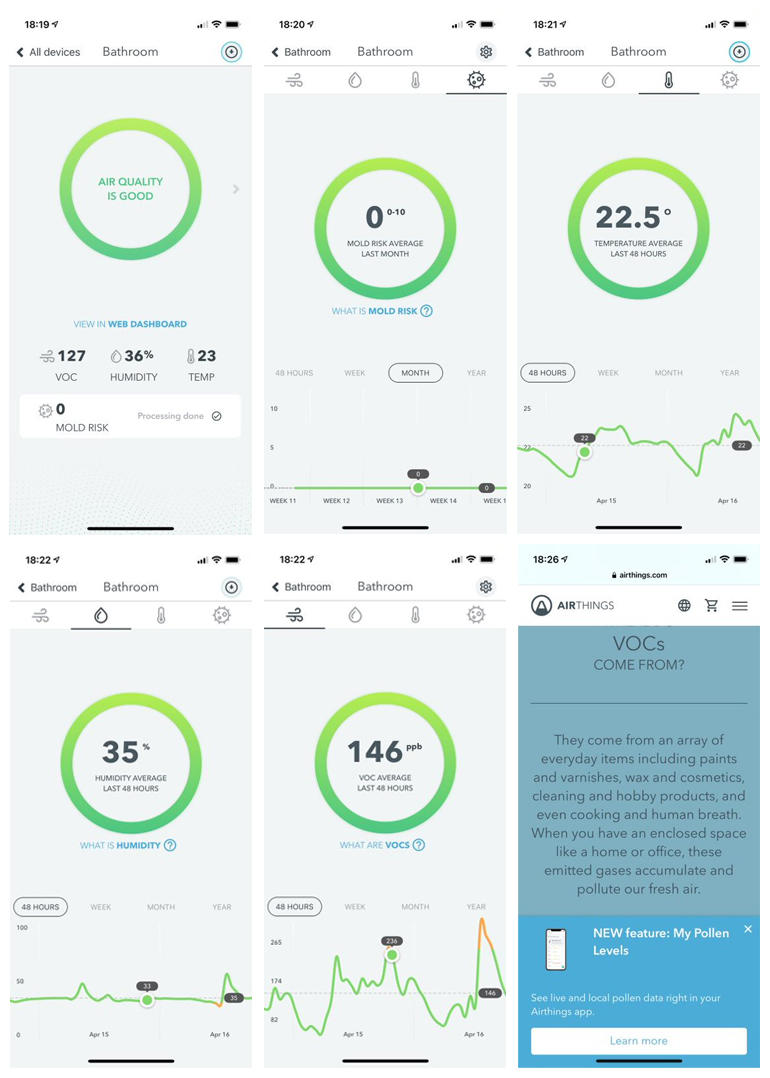Given the amount of time we’ve been spending indoors, with computers and game consoles on more often, you might be wondering about the air quality in your home. Airthings has a range of smart air quality monitors, and we’ve looked at the compact, battery-powered Wave Mini (£69/$79.99), which recently added mould detection to its other air-quality sensors.
The Wave Mini is, as the name suggests, smaller than the Wave Plus (£239/$229.99) and does slightly less. The Wave Plus has sensors for temperature, humidity, air pressure, CO2, radon and Volatile Organic Compounds (VOCs) — which could be chemicals from paint, cleaning products, memory foam mattresses, printers, plastic in a new gadget or glue in new furniture off-gassing when you first unpack it — and, ironically, air fresheners. But VOCs cover a fairly wide range of chemicals: the formaldehyde in MDF furniture and methane from compost heaps, or rotting debris in a pipe, but also the acetone in nail polish remover. VOCs can come from scented candles and — judging by the daily readings from putting the Wave Mini in a bathroom — shower gel.

Airthings’ Wave Mini measures humidity, temperature and VOC levels, as well as calculating whether the room is at risk of mould.
Images: AirthingsHigh levels of VOCs can irritate your eyes, nose and throat, give you a headache or make it hard for asthmatics to breathe. They also have long-term health risks, so it’s useful to know if there’s a build-up. In many cases the answer is to improve ventilation. That’s also how to deal with high humidity, although you also don’t want the humidity to drop too low, as that can cause headaches or make it easier to catch a virus (modern buildings with sealed windows and air conditioning often have lower humidity levels).
If you’re in an area where radon is a risk (it seeps out of granite), you likely already have a radon detector, but it’s useful to be able to track it over time, and there’s an audible radon alarm on the Wave Plus.
The Wave Mini only measures humidity, temperature and VOC levels, as well as calculating whether the room is at risk of mould. We tested the latter in a bathroom that had once had a mould problem; this was dealt with by improving ventilation and applying mould-resistant primer and paint, but it was reassuring to see that the mould risk score remained low. The Wave Mini is not detecting the presence of mould though; just whether the conditions are right for mould to grow quickly.
This is a software update that works on existing Wave Mini units, but not on the Wave or Wave Plus models. Airthings told us that’s because those models have radon sensors (which the Mini doesn’t); the radon sensors are sensitive to high humidity and can become damaged if exposed to humidity levels greater than 80%, so it doesn’t make sense to encourage customers to put them in rooms with enough humidity for mould to be a concern.
None of the Airthings Wave models measure particulates, which are another airborne health concern. However, there’s a pollen report in the app based on your current location, and you can see external air quality for your area, which includes predicted particulate levels.

Keep tabs on air quality — within Bluetooth range — via Airthings’ mobile app.
Images: Mary Branscombe / ZDNetSimple but local
The Wave Mini is simple to install because it pairs to the app on a smartphone over Bluetooth, and then spends a week collecting readings to calibrate itself. You can mount it on the wall or prop it up with a snap-on stand, and you’re supposed to place it three feet away from any windows or vents. However, you should put it closest to where you’re worried about mould, even if that’s the window.
If you’re concerned about the air quality at any given moment, you can wave your hand in front of the sensor (hence the name) and it lights up: green for good air quality, yellow for average, and red if there are high levels of contaminants. You can also ask Google Assistant for an air quality report. But especially for humidity and mould (and radon if you have the Wave Plus), it’s more useful to look at the patterns of air quality over time, which you can do via the phone app or web dashboard. The main difference is that the phone app has separate views for each measurement and fixed ranges (2 days, a week, a month and a year), while the dashboard shows you all the charts together, and you can pick a custom period, or export the data in CSV format.
There’s no built-in way to use these measurements to control other devices in your home directly. There’s an IFTT channel, so you can get notifications of changes in air quality by email or text, but there aren’t the same applets to connect to other smart home devices like WeMo smart plugs (perhaps to turn on a fan or an air purifier) as there are for the Wave Plus. And because the Wave Mini connects over Bluetooth, your phone has to be in range, unless you also invest in the Hub (£69/$79.99), which you’d need for remote monitoring.
The Wave Mini won’t automatically solve any air quality issues — it can’t pinpoint the cause, just the levels of what the sensors can measure. But if you’re trying to improve air quality in a home or office (or find out whether changes you’ve already made to ventilation are effective), it could prove useful.
Businesses looking for more comprehensive understanding of air quality may also be interested in Airthings’ Wave Mini for Business, which uses readings from its CO2, temperature and humidity sensors to predict ventilation rate, room occupancy and the survival rates for viruses in the current conditions, calculated as an overall risk level for microdroplet levels of any airborne virus.
RECENT AND RELATED CONTENT
Netatmo Healthy Home Coach, First Take: A stylish and usable air quality monitor
Foobot, First Take: A flexible and useful air quality monitor
How the pandemic revealed the smart home paradox
IoT: Meet the computer scientist making the smart home a more helpful place to live
Read more reviews






















